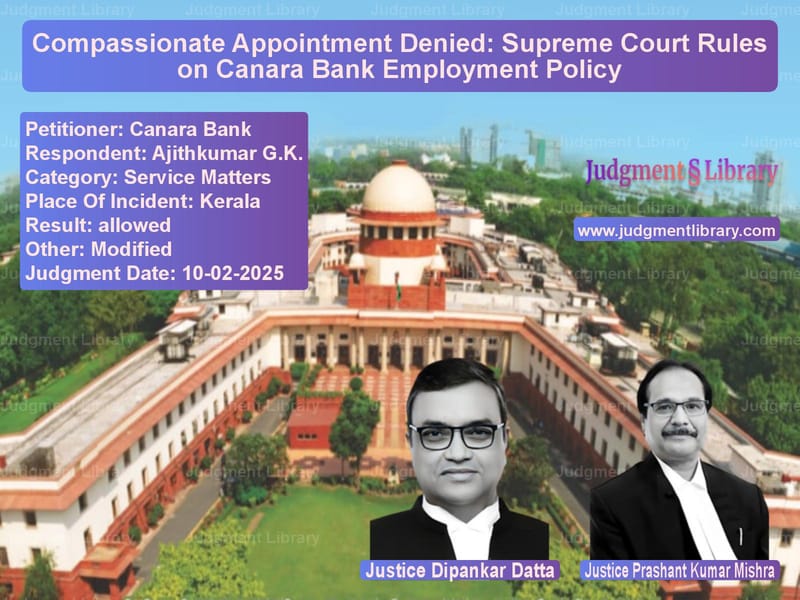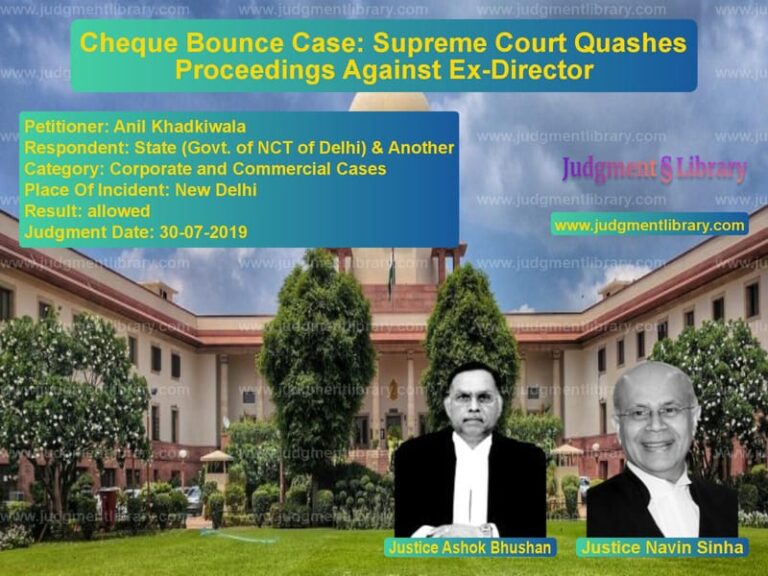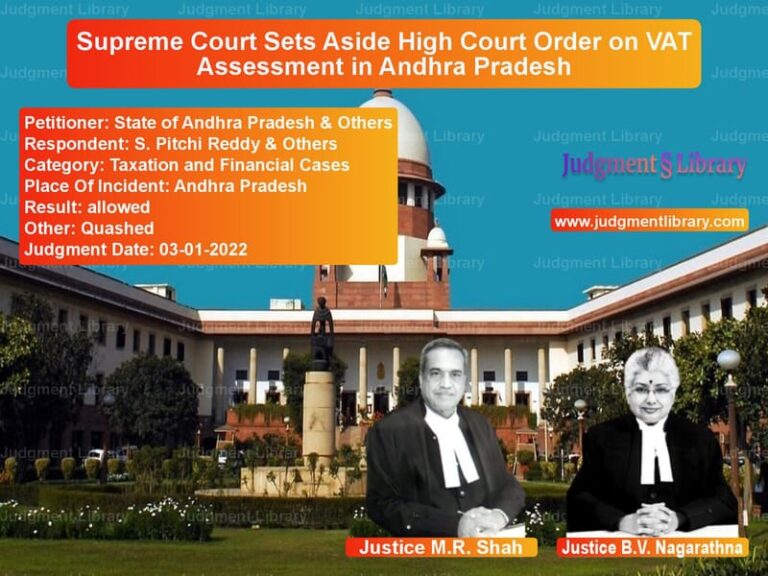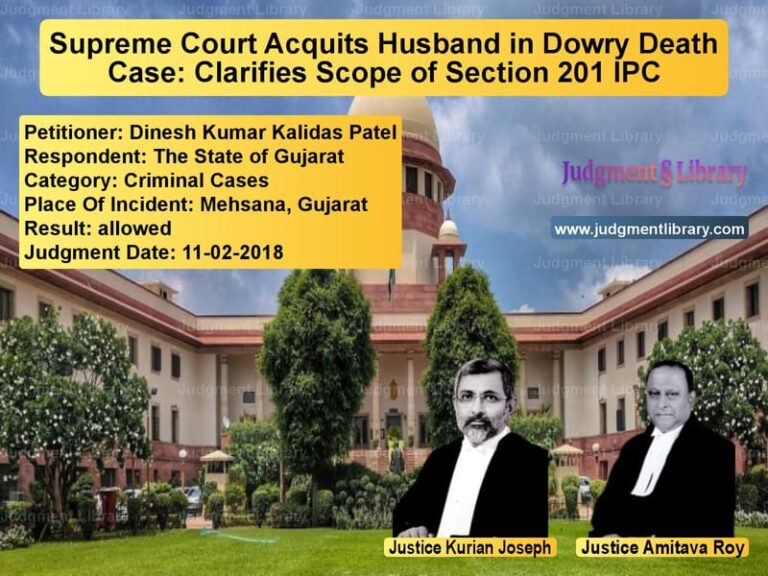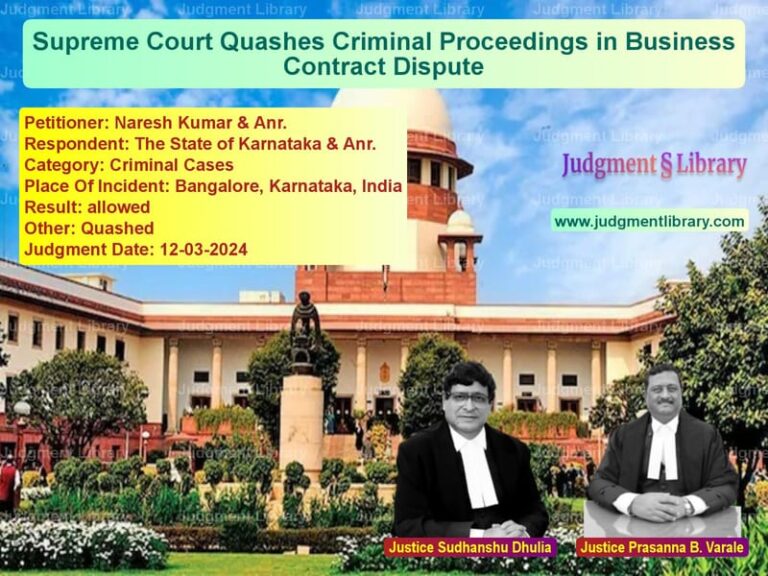Compassionate Appointment Denied: Supreme Court Rules on Canara Bank Employment Policy
The case of Canara Bank vs. Ajithkumar G.K. is a significant ruling by the Supreme Court of India concerning compassionate appointments in public sector banks. The Court examined whether an applicant’s financial condition should be considered while granting employment under a compassionate appointment scheme.
The case arose from the rejection of a compassionate appointment claim made by Ajithkumar G.K., whose father, an employee of Canara Bank, passed away four months before retirement. Despite the family receiving a pension and terminal benefits, Ajithkumar sought employment under the 1993 Compassionate Appointment Scheme of Canara Bank. The bank denied the request, citing financial stability and overage criteria. The High Court ruled in favor of Ajithkumar, directing the bank to appoint him, but the Supreme Court overturned the decision.
Background of the Case
The key facts of the case are as follows:
- Ajithkumar’s father passed away on December 20, 2001, while serving in Canara Bank.
- At the time, Canara Bank had a Compassionate Appointment Scheme (1993) that allowed dependents of deceased employees to apply for a job.
- Ajithkumar applied for the appointment on January 15, 2002.
- The bank rejected the application on October 30, 2002, citing the family’s financial stability and Ajithkumar exceeding the 26-year age limit.
- After repeated reconsideration requests, the bank reaffirmed its decision in 2003.
- Ajithkumar filed a writ petition in the Kerala High Court, which ruled in his favor in June 2015 and directed the bank to reconsider his application.
- Despite the order, the bank denied employment again in September 2015, arguing that his family was financially stable.
- Ajithkumar filed a second writ petition, and the High Court ruled in his favor again in June 2016, directing Canara Bank to appoint him and pay Rs. 5 lakh as compensation.
- The bank filed an intra-court appeal, which was dismissed, with an additional Rs. 5 lakh cost imposed on the bank.
- Canara Bank appealed to the Supreme Court.
Arguments Before the Supreme Court
Canara Bank’s (Appellant’s) Arguments
The bank, represented by its legal counsel, contended:
- The financial condition of the applicant’s family should be a primary factor in deciding compassionate appointments.
- The bank’s 1993 scheme explicitly allowed relaxation in age only for cases meeting financial distress criteria.
- The High Court wrongly interpreted the Canara Bank vs. M. Mahesh Kumar case, which did not set a precedent against considering financial stability.
- The bank had transitioned to a lump sum ex-gratia scheme in 2005, which replaced the previous appointment scheme.
- The High Court’s direction to provide an appointment was excessive and contrary to Supreme Court precedents.
Ajithkumar’s (Respondent’s) Arguments
The respondent, through his counsel, argued:
- The 1993 scheme did not require financial hardship as a mandatory condition.
- Canara Bank’s rejection was arbitrary, especially since they had the power to relax the age limit.
- The bank failed to properly assess the family’s financial condition.
- The compensation and penalties imposed by the High Court were justified, given the delay in justice.
Supreme Court’s Observations
The Supreme Court ruled that the High Court had overstepped its jurisdiction by directing an appointment. The bench, comprising Justices Dipankar Datta and Prashant Kumar Mishra, held:
“Compassionate appointment is not an entitlement or a vested right. It is a concession that must be exercised carefully, considering the financial condition of the deceased employee’s family.”
The Court emphasized that:
- The fundamental objective of compassionate appointment is to help families facing financial distress.
- The bank’s assessment of financial condition, including family pension and terminal benefits, was reasonable.
- Relaxation in age is permissible only when the financial hardship condition is met.
- Compassionate appointment should not be treated as a reservation or inheritance.
Final Judgment
The Supreme Court ruled:
- The High Court’s orders directing Canara Bank to appoint Ajithkumar were set aside.
- The compensation and penalty imposed on Canara Bank were also overturned.
- However, recognizing the long duration of litigation, the Supreme Court directed Canara Bank to pay Rs. 2.5 lakh as a lump sum ex-gratia amount to Ajithkumar within two months.
Key Takeaways
- Compassionate appointment is not automatic: It is a discretionary relief granted under exceptional circumstances.
- Financial hardship is a crucial factor: Applicants must demonstrate immediate financial distress.
- Judicial restraint in employment matters: Courts cannot impose appointments in compassionate cases without evaluating eligibility criteria.
- Employer discretion is valid: Public sector organizations have the right to assess applications based on their policies.
- Time-bound resolution: Courts should ensure swift resolution of compassionate appointment cases to avoid undue hardship.
Conclusion
The Supreme Court’s decision reinforces the principle that compassionate appointments should be granted judiciously, ensuring that they serve their intended purpose. While rejecting Ajithkumar’s appointment, the Court acknowledged the prolonged litigation and provided financial relief. This ruling serves as a precedent for future cases involving compassionate employment policies in public sector organizations.
Petitioner Name: Canara Bank.Respondent Name: Ajithkumar G.K..Judgment By: Justice Dipankar Datta, Justice Prashant Kumar Mishra.Place Of Incident: Kerala.Judgment Date: 10-02-2025.
Don’t miss out on the full details! Download the complete judgment in PDF format below and gain valuable insights instantly!
Download Judgment: canara-bank-vs-ajithkumar-g.k.-supreme-court-of-india-judgment-dated-10-02-2025.pdf
Directly Download Judgment: Directly download this Judgment
See all petitions in Employment Disputes
See all petitions in Public Sector Employees
See all petitions in Recruitment Policies
See all petitions in Judgment by Dipankar Datta
See all petitions in Judgment by Prashant Kumar Mishra
See all petitions in allowed
See all petitions in Modified
See all petitions in supreme court of India judgments February 2025
See all petitions in 2025 judgments
See all posts in Service Matters Category
See all allowed petitions in Service Matters Category
See all Dismissed petitions in Service Matters Category
See all partially allowed petitions in Service Matters Category

